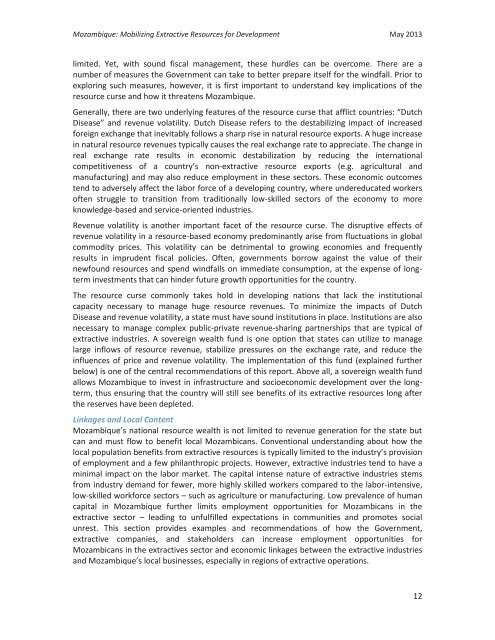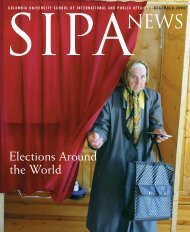Mozambique - School of International and Public Affairs - Columbia ...
Mozambique - School of International and Public Affairs - Columbia ...
Mozambique - School of International and Public Affairs - Columbia ...
You also want an ePaper? Increase the reach of your titles
YUMPU automatically turns print PDFs into web optimized ePapers that Google loves.
<strong>Mozambique</strong>: Mobilizing Extractive Resources for Development May 2013<br />
limited. Yet, with sound fiscal management, these hurdles can be overcome. There are a<br />
number <strong>of</strong> measures the Government can take to better prepare itself for the windfall. Prior to<br />
exploring such measures, however, it is first important to underst<strong>and</strong> key implications <strong>of</strong> the<br />
resource curse <strong>and</strong> how it threatens <strong>Mozambique</strong>.<br />
Generally, there are two underlying features <strong>of</strong> the resource curse that afflict countries: “Dutch<br />
Disease” <strong>and</strong> revenue volatility. Dutch Disease refers to the destabilizing impact <strong>of</strong> increased<br />
foreign exchange that inevitably follows a sharp rise in natural resource exports. A huge increase<br />
in natural resource revenues typically causes the real exchange rate to appreciate. The change in<br />
real exchange rate results in economic destabilization by reducing the international<br />
competitiveness <strong>of</strong> a country’s non-extractive resource exports (e.g. agricultural <strong>and</strong><br />
manufacturing) <strong>and</strong> may also reduce employment in these sectors. These economic outcomes<br />
tend to adversely affect the labor force <strong>of</strong> a developing country, where undereducated workers<br />
<strong>of</strong>ten struggle to transition from traditionally low-skilled sectors <strong>of</strong> the economy to more<br />
knowledge-based <strong>and</strong> service-oriented industries.<br />
Revenue volatility is another important facet <strong>of</strong> the resource curse. The disruptive effects <strong>of</strong><br />
revenue volatility in a resource-based economy predominantly arise from fluctuations in global<br />
commodity prices. This volatility can be detrimental to growing economies <strong>and</strong> frequently<br />
results in imprudent fiscal policies. Often, governments borrow against the value <strong>of</strong> their<br />
newfound resources <strong>and</strong> spend windfalls on immediate consumption, at the expense <strong>of</strong> longterm<br />
investments that can hinder future growth opportunities for the country.<br />
The resource curse commonly takes hold in developing nations that lack the institutional<br />
capacity necessary to manage huge resource revenues. To minimize the impacts <strong>of</strong> Dutch<br />
Disease <strong>and</strong> revenue volatility, a state must have sound institutions in place. Institutions are also<br />
necessary to manage complex public-private revenue-sharing partnerships that are typical <strong>of</strong><br />
extractive industries. A sovereign wealth fund is one option that states can utilize to manage<br />
large inflows <strong>of</strong> resource revenue, stabilize pressures on the exchange rate, <strong>and</strong> reduce the<br />
influences <strong>of</strong> price <strong>and</strong> revenue volatility. The implementation <strong>of</strong> this fund (explained further<br />
below) is one <strong>of</strong> the central recommendations <strong>of</strong> this report. Above all, a sovereign wealth fund<br />
allows <strong>Mozambique</strong> to invest in infrastructure <strong>and</strong> socioeconomic development over the longterm,<br />
thus ensuring that the country will still see benefits <strong>of</strong> its extractive resources long after<br />
the reserves have been depleted.<br />
Linkages <strong>and</strong> Local Content<br />
<strong>Mozambique</strong>’s national resource wealth is not limited to revenue generation for the state but<br />
can <strong>and</strong> must flow to benefit local Mozambicans. Conventional underst<strong>and</strong>ing about how the<br />
local population benefits from extractive resources is typically limited to the industry’s provision<br />
<strong>of</strong> employment <strong>and</strong> a few philanthropic projects. However, extractive industries tend to have a<br />
minimal impact on the labor market. The capital intense nature <strong>of</strong> extractive industries stems<br />
from industry dem<strong>and</strong> for fewer, more highly skilled workers compared to the labor-intensive,<br />
low-skilled workforce sectors – such as agriculture or manufacturing. Low prevalence <strong>of</strong> human<br />
capital in <strong>Mozambique</strong> further limits employment opportunities for Mozambicans in the<br />
extractive sector – leading to unfulfilled expectations in communities <strong>and</strong> promotes social<br />
unrest. This section provides examples <strong>and</strong> recommendations <strong>of</strong> how the Government,<br />
extractive companies, <strong>and</strong> stakeholders can increase employment opportunities for<br />
Mozambicans in the extractives sector <strong>and</strong> economic linkages between the extractive industries<br />
<strong>and</strong> <strong>Mozambique</strong>’s local businesses, especially in regions <strong>of</strong> extractive operations.<br />
12

















